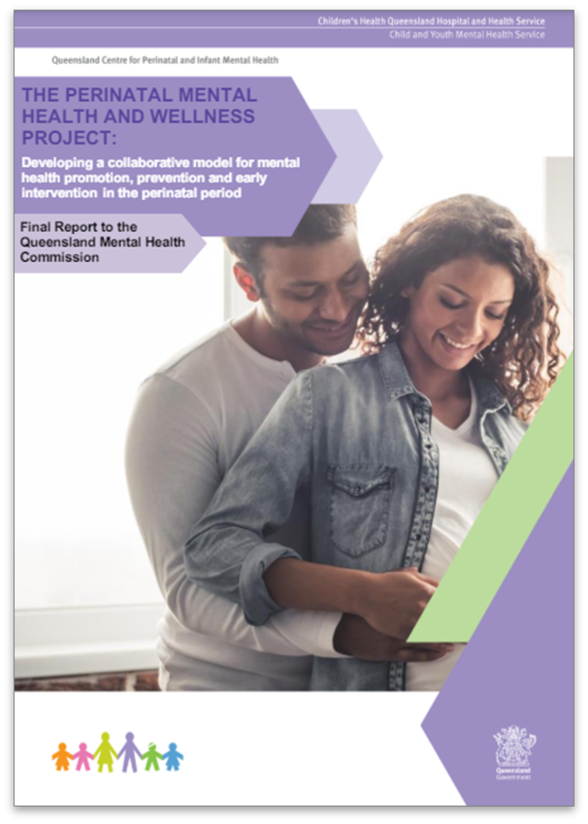The Perinatal Mental Health and Wellness Project: Developing a collaborative model for mental health promotion, prevention and early intervention in the perinatal period, September 2017
The Perinatal Mental Health and Wellness Project, conducted from 2015 to 2017, aimed to develop and evaluate a collaborative model for mental health promotion, illness prevention and early intervention in the perinatal period.
The model focused on promoting the emotional health and wellbeing of families in the perinatal period from approximately 12 weeks into pregnancy to approximately 8 weeks after birth.
Key innovations of the project included:
- parents with lived experience of perinatal mental health issues were involved in the delivery of antenatal and postnatal education, including the translation of clinical information into stories and examples of lived experience
- face-to-face group education sessions for expectant and new parents emphasised mental health and emotional wellbeing in the perinatal period
- a postnatal education session (Postnatal Connections) was offered in addition to an antenatal education session (Emotional Preparation for Parenthood) for the same cohort
- the sessions were delivered collaboratively by staff from clinical services, non-government services and peer-led services, who also worked to strengthen cross-department and crosssectoral referral pathways among their services
- the mental health and emotional wellbeing of fathers and partners was valued alongside that of mothers, and sessions encouraged parents to support each other through the perinatal period
- infant mental health and emotional wellbeing were addressed in antenatal and postnatal education sessions
Components of the model included:
- antenatal education for expectant mothers, fathers, partners and support persons, with a focus on Emotional Preparation for Parenthood, delivered from approximately 28 weeks’ gestation
- a postnatal education session for the same cohort, to reinforce a focus on emotional health and wellbeing for both parents and infants, offered approximately 6-8 weeks after birth
- active encouragement and empowerment of participants to form connections and continue supporting one another, for example through the formation of playgroups
- targeted peer support groups provided for parents experiencing symptoms of perinatal mental illness, conducted by peer support workers, who were supported by regular reflective supervision with a perinatal mental health clinician and mentorship by an experienced peer worker
- formalisation and documentation of referral pathways for expectant and new parents identified as experiencing symptoms of mental illness, among the organisations participating in the collaboration (maternity service, perinatal mental health service, child health service, peer-led organisation, non-government services)
- closer collaboration among public health services, non-government services and peer-led services, to provide information and resources to support the emotional health and wellbeing of expectant and new parents and their infants and families
- a focus on improving awareness of the importance of emotional health and wellbeing in the perinatal period, among staff of collaborating organisations and their networks.
The project took a place-based action research approach, developing and trialing the model through Redcliffe Hospital Maternity Services in the Metro North Hospital and Health Service, with a view to producing reports, resources and recommendations to support a similar model being implemented in other sites across Queensland and potentially in other jurisdictions.
The project was jointly funded by the Statewide Maternity and Neonatal Clinical Network, Clinical Excellence Division, and the Queensland Mental Health Commission, with in-kind support from participating organisations including Children’s Health Queensland Hospital and Health Service, Metro North Hospital and Health Service, Hope’s Room Limited, and Women’s Health Queensland Wide.
The model developed through the project sees joined-up, patient-centred services delivered through collaboration among public health services including maternity, mental health and child health services, and non-government services including peer-led organisations. The model encourages a holistic approach to the mental health and emotional wellbeing of expectant and new parents, their infants and families. While such an innovative project presented challenges at many levels, evaluation has been overwhelmingly positive and the model is seen as holding considerable promise for implementation in other areas.
This report provides a summary of project processes and outcomes, and a set of Recommendations for the implementation of similar initiatives in other sites. Greater detail is provided in the project outputs including manuals, resources and publications.

